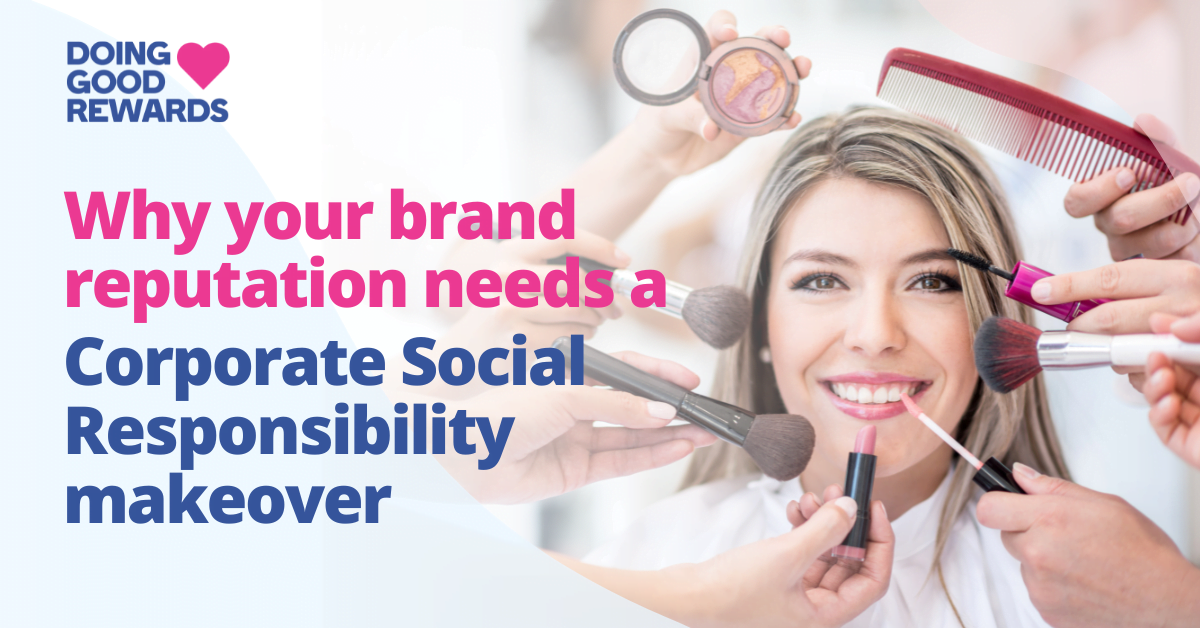
Why your brand reputation needs a Corporate Social Responsibility makeover
No matter how you would like people to regard your business, you can’t escape the truism that perception is reality.
You can’t just hope that people will see you as trustworthy or offering high-quality products or the leader in your field and you can’t simply state any of those things as fact and assume everyone will believe you.
Everything that helps build a meaningful brand reputation comes from what you do and how you do it, rather than what you say you do.
Until you have hundreds of five-star reviews providing a significant pool of positive reinforcement, customers and potential customers will be making their own assessments based on their own experiences.
CSR can be a significant point of difference
Whatever means or media you use to promote your business, you want people to know your brand.
Not just what you make, sell, or offer, but what you stand for; what they should expect if they choose to deal with you. What sets your business apart so that someone will feel that they’re making a good choice buying from you or working with you.
Implementing CSR initiatives, and articulating their purpose and value, has the potential to be a significant brand differentiator.
While consumers might not be all that interested in the ins and outs of how you run your business, they will care if they know you source your materials ethically and treat your workers well. There’s a good chance they’ll care even more – and make it known – if you don’t do those things!
Remember, your reputation can be damaged by negative perceptions more readily than it can be boosted by doing a great job.
Consumers expect a level of social responsibility
Studies have shown that the majority of consumers are not particularly cynical. They’re more likely to expect that everything’s good until they’re told otherwise and think that most businesses they deal with will offer decent products or services at reasonable value.
That perception can change very quickly, though, if a company is reported to be a big polluter, has poor working conditions, has failed to pay employees adequately, is price-gouging, or anything else that shows them to be less than a good corporate citizen.
Given that landscape, how can implementing CSR initiatives improve a brand’s reputation?
Simply by being proactive.
Sure, you can score a few points by doing what’s expected – tick those boxes and you get a pass.
But if you want real cut-through, a meaningful boost to your reputation, be smarter and more purposeful.
Stand for something and let people know that it means something to your business. Be truly invested and engaged and people will recognise that ‘doing good’ is embedded within your company culture.
Even small things can have real impact
You don’t have to change the world (at least not straight away) to be known as a business that takes CSR seriously.
For example, every hospitality business that has switched from single-use plastic straws to a greener alternative has made a statement that they care about the environment.
Just think about how recently almost everyone was using polystyrene cups. Now they’re nowhere to be seen. That movement started somewhere and evolved to the point where coffee drinkers carry their own reusable cups and local coffee shops and coffee carts are happy to fill them.
Someone first proposed the idea of offering customers the option of rounding up for charity, and now that concept has proliferated from McDonald’s and the big supermarket chains all the way down to smaller businesses.
Grand gestures might be impressive, but it’s more important to do things that the average person can relate to, see as meaningful, and know are sustainable as core practices of your business.
Brand reputation impacts your bottom line
While some CSR initiatives are relatively easy to implement, you shouldn’t make the mistake of letting them go unnoticed. You deserve to get whatever value you can from your CSR.
Let people know about all your CSR activities through your own channels (your website and social media) and, whenever possible, through mass media. CSR activities communicated via mass media – essentially free advertising – are a great way to create awareness and help build an image of your brand as one that is socially responsible.
The more thoughtful you are in the formulation and integration of CSR initiatives, the more likely that people will sit up and take notice – and that includes prospective employees.
Your CSR credentials should help you develop a positive reputation, increase your brand value, nurture an engaged and committed workforce and, ultimately, attract more business.
Nobody should be thinking about CSR as purely charitable anymore. Go ahead and make regular donations if that works for you, but when it comes to your overarching CSR program it should really work for you by contributing to the success and profitability of your business.
At DGR, we offer a CSR Audit for businesses looking to create meaningful charitable partnerships that make you stand out from the crowd. Book an initial consultation to find out how we can help.
Recent Posts
- 4 Tips For Communicating Your Social Impact
- Changemaker Consumers: 2023 Trends All Brands Need to Know
- Put your holiday spending to great use this holiday season!
- Stop just giving money to charity and go ‘full CSR’ with purpose
- The right way to promote and profit from your Corporate Social Responsibility credentials
Categories
Click here to email us & we’ll contact you to send more info
Click here to book a 15 min Zoom meeting to find out more
What would you like to do?

Stay ahead of the trends and the competition
Download Free PDF

